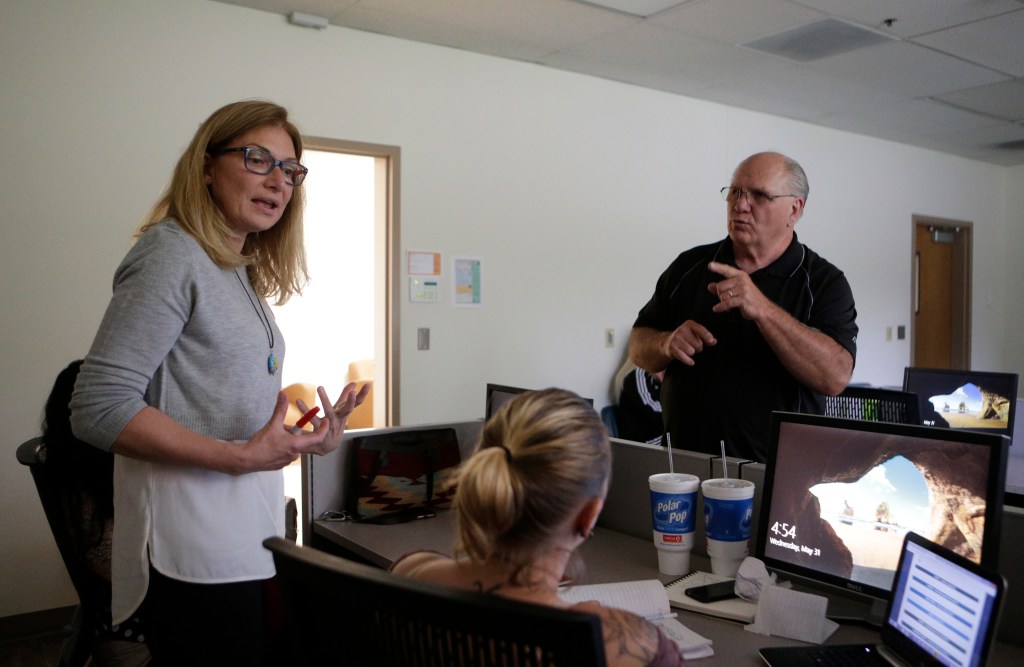Sign language interpreter retires from COCC
Published 5:40 am Thursday, June 8, 2017

- Dave Hagenbach, right, interprets for deaf students as teacher Alexandra Amourgis, left, teaches at Central Oregon Community College on Wednesday. (Joe Kline/Bulletin photo)
Dave Hagenbach’s 30-year journey as an American Sign Language interpreter wasn’t academic at first.
Hagenbach, who will retire this summer after nearly 13 years with Central Oregon Community College, started his journey with romance.
He met the woman he would eventually marry when she was in college. She had no hearing in her left ear from birth and eventually lost all hearing in her right ear as well, around the time she was 19. Because she was able to hear things for much of her life, she hadn’t attended schools for deaf students. Instead, she needed to learn ASL as a young adult, and when Hagenbach met her, he wanted to learn it, too.
So Hagenbach learned sign language by immersing himself in conversation with her.
“I kind of look back and remember seeing deaf people, only because I remember seeing someone signing,” Hagenbach said. “But that’s when it got my attention — knowing that maybe my future wife was going to be losing her good ear.”
Hagenbach is the ASL interpreter coordinator at COCC for the school’s disability services department.
He interprets in the classroom but also has appointments with students who are deaf or hard of hearing and coordinates when interpreters will be in classrooms with them.
On average, there are about five students each term who need ASL interpreters.
This past term at COCC, there were five interpreters, including Hagenbach, he said. Generally, interpreters cover the same classes each week, but the schedule can change.
For one weekly 21⁄2-hour class, for example, Hagenbach worked with another interpreter, each of them signing for about 15-20 minutes before switching off.
Listening to lectures on complex subjects, or ones that use language highly specific to a course — such as chemistry — can be challenging to translate. There might not be a sign for a specific term, and it may be time-consuming to spell. But there are tricks to the trade.
“Say it’s a word that’s used over and over in a class,” Hagenbach said. “Like iron pyrite, for some reason if this word keeps being repeated, you might finger spell it the first couple times, then I’ll just do ‘IP.’”
During his time at COCC, Hagenbach interpreted beyond the classroom. In addition to signing events like commencements, Hagenbach hit the trails with the college’s Outdoor Leadership program. Hagenbach became friends with one student he interpreted for.
“He loves the outdoors,” Hagenbach said. “So I learned a lot of stuff just from him.”
The trips included ice climbing at Mount Hood, hiking, canoeing and camping.
“I used to do a lot of backpacking when I was younger,” Hagenbach said of his enthusiasm for the trips.
Hagenbach said at times he would invent signs with the student as unusual words or phrases came up. That was especially helpful on those trips.
“In the outdoors, the teacher’s using a phrase that’s new or different, or it’s the name of a river — you might finger spell the word the best you know how.”
While doing physical activities and trying to communicate with your hands at the same time might sound impossible, Hagenbach said the deaf community finds ways around it — just like deaf people can manage to sign while driving.
But it wasn’t necessarily foolproof.
“I remember when we were canoeing one time, he was in the back steering the canoe,” Hagenbach said of his outdoor student. “So I was telling him we’ve got to turn so we don’t run over the fishing line.”
But run over it they did, Hagenbach said, chuckling. He wasn’t sure if the student had seen him sign and ignored him, or got overwhelmed steering, keeping an eye on what was ahead on the river and not paying attention to Hagenbach signing.
Translating for a class leaves a lot of decisions up to the interpreter, according to Hagenbach.
“If I interpreted everything that the teacher is saying, she wouldn’t be able to focus on the movements of the teacher,” Hagenbach said of a student who took an exercise class this term.
Hagenbach said he’s tried passing on that kind of knowledge to interpreters who will take over next year.
“It is a job you have to be on the fly sometimes,” Hagenbach said.
Hagenbach said that’s fun for him since he tends to be a spontaneous person.
“I don’t need to learn everything ahead of time, let’s just learn as we go,” he said.
Jamie Rougeux, a coordinator for COCC’s disability services, is much newer to the school than Hagenbach, but said he will be highly missed.
“He is very respected up here,” she said. “I think over the years, his classroom time has really helped people learn a lot about the deaf community.”
Rougeux referred to Hagenbach as a “liaison” in that way. Not only is he a friendly, nice guy and easy to work with, she said, he always wants to put the students first.
“He’s always willing to problem-solve,” Rougeux said, “and do whatever is necessary to serve the students.”
— Reporter: 541-383-0325, kfisicaro@bendbulletin.com
If I interpreted everything that the teacher is saying, (a student) wouldn’t be able to focus on the movements of the teacher. … It is a job you have to be on the fly sometimes.”— Dave Hagenbach






